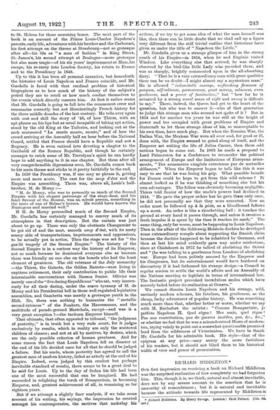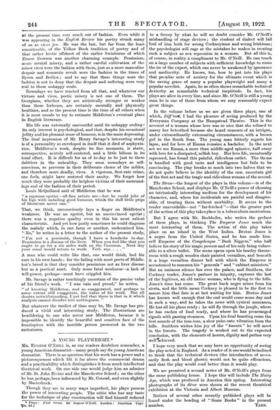RICHARD MIDDLETON.*
Ova first impression on receiving a book on Richard Middleton was the surprised realization of how eompletely we had forgotten him. This, though it is, we think, natural and almost inevitable, does not by any means amount to the assertion that he is unworthy of remembrance ; but it is natural and inevitable because the attitude towards life represented by Middleton is • Richard Middleton. By Henry Savage. London: Cecil Palmer. 1128. 661. net.] at the present time very much out of fashion. Even while it was appearing in the English Review his poetry strack many of us as tieux jeu. He was the last, but far from the least
considerable, of the Yellow Book tradition of poetry and of that rather hectic offshoot of the earlier Swinburne of which
Ernest Dowson was another charming example. Pessimism, acute mental misery, and a rather careful cultivation of the minor vices were the fashion with them, just as a more masculine despair and romantic revolt were the fashion in the times of
Byron and Berlioz ; and to say that these things were the fashion is not to deny that the despair and suffering were very real to those unhappy souls.
Nowadays we have reacted from all that, and whatever our 'virtues and vices, poetic misery is not one of them. The Georgians, whether they are artistically stronger or weaker than those forbears, are certainly mentally and physically healthier, and so the present time is the time of all others when it is most unsafe to try to estimate Middleton's eventual place in English literature.
His life was externally uneventful until its unhappy ending : its only interest is psychological, and that, despite his occasional jollity and his pleasant sense of humour, is in the main depressing.
The final impression of Mr. Henry Savage's interesting study is of a personality so enveloped in itself that it died of asphyxia- tion. Middleton's work, despite its fine moments, is static, retrospective, acutely self-centered, and a little bilious in its total effect. it is difficult for us of to-day to be just to these dabblers in the unhealthy. They seem nowadays so self - conscious, so perverse in their deliberate choice of the milder, and therefore more deadly, vices. A vigorous, first-rate crime, one feels, might have restored their sanity. We forget how much they were probably the helpless victims of their surround- ings and of the fashion of their period.
Louis McQuilland said of Middleton that he was
" a supreme egotist—all fine artists are—but he could joke of his Ego with unfailing good humour, which the dull little prigs of literature never can.
That, we think, unconsciously lays a finger on Middleton's weakness. He was an egotist, but an unconvinoed egotist ;
there was a negative quality even in this his most salient characteristic. And yet how justly sometimes he could diagnose the malady which, in one form or another, undermined him.
" No," he writes -in a letter to the author of the present study,
" I'm not a pessimist, though I have a headache to-day. Pessimism is a disease of the liver. When you feel like that you ought to go for a six miles walk on the Common. Next day your mind would return to work. Verb. sap. . . . "
A man who could write like that, one would think, had his cure in his own hands ; for the failing with most poets of Middle. ton's breed is that they consider pessimism not as liver disease but as a poetical asset. Only some fatal weakness—a lack of will-power, perhaps—must have crippled him.
Mr. Savage is rather touchingly uncertain of the precise value of his friend's work. " I was vain and proud," he writes,
" of knowing Middleton, and so exaggerated, and perhaps to some extent still exaggerate, the value of his work. But all doubts notwithstanding, I yet feel that there is that in it which analysis cannot dissolve into nothingness. "
But whatever the verdict of time may be, Mr. Savage has pro- duced a vivid and interesting study. The illustrations are
bewildering to one who never saw Middleton, because it is impossible to identify the beautiful and sensitive face of the frontispiece with the horrible person presented in the two caricatures.



































 Previous page
Previous page